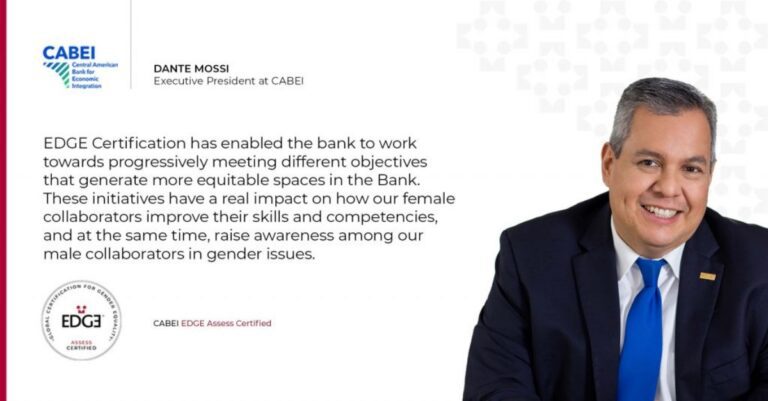The Central American Bank of Economic Integration (CABEI) continues to invest in gender equity to protect current and future generations.

It is now more than three years since the Central American Bank of Economic Integration (CABEI) set out on its journey towards achieving gender equity. It’s a journey that has led it to undertake a rigorous third-party examination of gender representation, pay equity, effectiveness of policies and practices and the organization’s culture. It’s a journey also that has led to a survey of its employees to evaluate and measure their experiences in terms of career development opportunities in their workplace.
The Central American Bank of Economic Integration (CABEI) is an international multilateral development financial institution with a global reach that funds programs working towards the elimination of inequality and poverty. The organization supports strengthening regional integration and focuses on environmental sustainability, with social and environmental challenges and opportunities in Central America being a key element of the Bank’s strategic purpose.
It was in this context that it first approached EDGE and obtained its initial EDGE Assess certification in 2019. Two years later, the Bank was re-certified, confirming the actions and programs underway to ensure gender equity at all management levels, and designing flexible working options for all employees throughout the Bank. Now it is going further, exploring its policy and approach to parental leave for both women and men, improving their work/life balance, and proactively communicating policies to prevent workplace sexual harassment and discrimination.
The Bank has created spaces to have conversations about these topics, express concerns, share experiences, address problematic situations, and propose solutions aimed at improving the employee experience at CABEI.
Creating awareness and relevancy
Dr Dante Mossi, Executive President at Central American Bank of Economic Integration (CABEI), says the Bank has made strong efforts to create awareness about the significance and relevancy of gender equity, respectful and ethical behaviors through all the operations: “The Bank has created spaces to have conversations about these topics, express concerns, share experiences, address problematic situations, and propose solutions aimed at improving the employee experience at CABEI,” he explains.
Many things have changed. For example, the Bank formed an interdisciplinary task force to manage strategically all the CABEI gender issues and projects. As a result of this, the Bank is more interested in listening and understanding how colleagues perceive gender, inclusion, and respect in the Bank, generating some important initiatives to establish milestones through time. The Human Resources (HR) Department has also launched several projects oriented to promoting female talent, such as Female Mentoring, a Woman Lead Program, and the Gender Pay Gap Analysis, among others.
“Many things have changed. For example, the Bank formed an interdisciplinary task force to manage strategically all the CABEI gender issues and projects. As a result of this, the Bank is more interested in listening and understanding how colleagues perceive gender, inclusion, and respect in the Bank, generating some important initiatives to establish milestones through time. The Human Resources (HR) Department has also launched several projects oriented to promoting female talent, such as Female Mentoring, a Woman Lead Program, and the Gender Pay Gap Analysis, among others.”
EDGE Certification has enabled the Bank to work towards progressively meeting different objectives that generate more equitable spaces in the organization.
Dr Mossi believes that the EDGE Certification at the Assess level has brought visibility and credibility to the positive change happening inside the organization. At the same time, he believes it is creating the opportunity for diverse talent to thrive at work: “EDGE Certification has enabled the Bank to work towards progressively meeting different objectives that generate more equitable spaces in the organization,” he continues.
These initiatives have a real impact on how our female colleagues improve their skills and competencies, and at the same time, raise awareness among our male colleagues in gender issues. EDGE Certification requires the involvement of different areas, generating a participatory process, and distributing responsibilities across the institution, resulting in a global team committed to the proposed gender objectives.
“These initiatives have a real impact on how our female colleagues improve their skills and competencies, and at the same time, raise awareness among our male colleagues in gender issues. EDGE Certification requires the involvement of different areas, generating a participatory process, and distributing responsibilities across the institution, resulting in a global team committed to the proposed gender objectives.”
Equity and Inclusion have an important significance for our youngest generations.
Engaging future generations
Dr Mossi is aware that the drive towards workplace gender balance, diversity, and inclusion is not just vital today for employees, customers and investors, but also critical to the next generation and future leaders of tomorrow: “Equity and Inclusion have an important significance for our youngest generations,” he continues.
The fact that the Bank committed to establishing more fair and equitable conditions for our colleagues and stakeholders is a good indicator for them to feel they are working in a place with purpose, an organization that is aware of the necessary changes in our societies.
“The fact that the Bank committed to establishing more fair and equitable conditions for our colleagues and stakeholders is a good indicator for them to feel they are working in a place with purpose, an organization that is aware of the necessary changes in our societies.”
It is necessary to take steps thinking about what are the priorities on which we must be focused,” he concludes, “and which are the ones that possibly take us more time to carry them out.
The Executive President also says it is important to mention that every change has its context and timing. He knows that the cultural evolution on which the Bank is embarking will take time and success cannot come overnight: “It is necessary to take steps thinking about what are the priorities on which we must be focused,” he concludes, “and which are the ones that possibly take us more time to carry them out.”
ABOUT CENTRAL AMERICAN BANK FOR ECONOMIC INTEGRATION (CABEI)
The Central American Bank for Economic Integration (CABEI), is an international multilateral development financial institution. Its resources are continuously invested in projects that foster development to reduce poverty and inequality; strengthen regional integration and the competitive insertion of its member countries in the global economy; providing special attention to environmental sustainability.
Its headquarters are in Tegucigalpa, Honduras, and has regional offices in Guatemala, El Salvador, Nicaragua, Costa Rica , Panamá, Dominican Republic, and the Republic of China Taiwan.
ABOUT EDGE CERTIFICATION
EDGE is the leading global assessment and business certification for gender and intersectional equity. EDGE Certification involves a rigorous third-party review of representation across the pipeline, pay equity, effectiveness of policies and practices, and inclusiveness of an organization’s culture. As an integral part of the assessment, statistical data is analysed, policies and practices are reviewed and employees’ experiences of career development opportunities in the current workplace are accounted for. Depending on the specific results of each organization, an action plan is formulated, and firm commitments towards its implementation.
EDGE Certification meets organizations where they are in their gender balance journey (EDGE) and in their intersectional equity journey (EDGEplus) through its three levels of certification: Assess, Move and Lead. A certification at the EDGE Assess level recognizes commitment, one at the EDGE Move level showcases progress and a certification at the EDGE Lead level celebrates success in fostering gender equitable workplaces. An EDGEplus certification further recognizing its commitment to analyzing intersectional issues between gender and one or several of the following additional dimensions: gender identity, race/ethnicity, LGBTQI+, working with a disability, nationality and age.
EDGE Certification is built around the independent third-party certification of data and information and is distinguished by its rigor and focus on impact granted by one of the EDGE accredited independent third-party certification bodies – SGS, Intertek or FloCert, it remains valid for a period of two years. EDGE’s current customer base consists of over 200 large organizations in 50 countries across five continents, representing 30 different industries.





